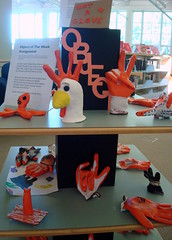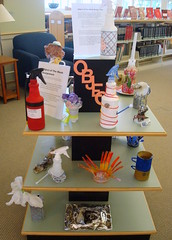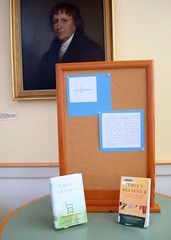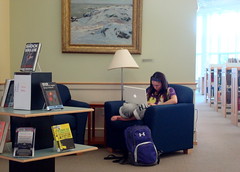We are celebrating Banned Books Week with a large display in the first floor hallway case, and these colorful pins.
Discussion about book challenges and banning books from libraries have already risen between students and staff alike.
Feel free to come have a look! Our display highlights just a fraction of banned or challenged books, and gives some of the reasons behind the attempted or successful bans.
Did you know, for example, that Roald Dahl's children's book James and the Giant Peach is often challenged? Come in and find out why!
Thursday, September 29, 2011
Monday, September 26, 2011
Object of the Week 2
Each student in Ms. Struck's art class will be transforming one object a week. Each week on Monday afternoon, the objects will be displayed somewhere in the library for that week, until the next objects arrive.
This week's item is a rubber glove. We are very impressed with the creativity that students have treated and transformed them.
This week's item is a rubber glove. We are very impressed with the creativity that students have treated and transformed them.
Friday, September 23, 2011
Text Books!
Tired of lugging all your text books around? Come to the library! Not only do we offer comfy chairs, a studious atmosphere and plenty of computers, but we also have all your text books.
Over the past few years, we have been keeping a cache of text books for students to use while in the library and it has become one of our most popular features. Students can come in, sans back ache, and ask one of the helpful librarians for any text book. We have all your subjects covered, from your 50 pound Science books to your small novels for English, all are available to be checked out and used in the library.
This is also helpful if you forget one of your books. Since we also have a copier, you can copy a few pages out of a text book; that way you are still prepared for class.
So stop in and lighten the load! Knowledge is power but it doesn’t have to be so heavy!
Wednesday, September 21, 2011
Computational Help Online
Search engines bring us data from around the world, which is fantastic. Sometimes there is just too much information to go through, which is less fantastic. Ultimately, though, selecting, interpreting and further processing the information brought to us by a search engine requires a human brain. There is help out there, too.
One novel approach to searching and data processing is called Wolfram|Alpha. It is not a search engine. Instead, it uses its own internal knowledge base to return answers to user questions. Their web site says t his about the project goals:
For example, typing in "birth rate Massachusetts" returns a results page that shows you a number of things. Firstly, it tells you that "Massachusetts annual births" was used instead of the literal query. Secondly, the results for the query are displayed in a demographics table. Options to display additional information are given as well; in this case, age and gender, ethnicity, and education information is available with the click of a button. The numbers are also converted into hourly, daily, weekly, and monthly birth rates. Lastly, it is possible to view thorough source information for these numbers, and download the data as a .pdf file.
Sounds like there are a lot of possibilities! Wolfram|Alpha is free for personal noncommercial use.
One novel approach to searching and data processing is called Wolfram|Alpha. It is not a search engine. Instead, it uses its own internal knowledge base to return answers to user questions. Their web site says t his about the project goals:
"We aim to collect and curate all objective data; implement every known model, method, and algorithm; and make it possible to compute whatever can be computed about anything. Our goal is to build on the achievements of science and other systematizations of knowledge to provide a single source that can be relied on by everyone for definitive answers to factual queries".
For example, typing in "birth rate Massachusetts" returns a results page that shows you a number of things. Firstly, it tells you that "Massachusetts annual births" was used instead of the literal query. Secondly, the results for the query are displayed in a demographics table. Options to display additional information are given as well; in this case, age and gender, ethnicity, and education information is available with the click of a button. The numbers are also converted into hourly, daily, weekly, and monthly birth rates. Lastly, it is possible to view thorough source information for these numbers, and download the data as a .pdf file.
Sounds like there are a lot of possibilities! Wolfram|Alpha is free for personal noncommercial use.
Monday, September 19, 2011
Object of the Week
Each student in Ms. Struck's art class will be transforming one object a week. Each week on Monday afternoon, the objects will be displayed somewhere in the library for that week, until the next objects arrive.
This week's item is a spray bottle. Unfortunately, "[n]ot every artist is represented each week," according to Ms. Struck, "for a variety of possible reasons."
Ms. Struck describes the project: "The idea behind this assignment is to challenge, question, and re-imagine our relationship with everyday objects. Through the process of doing this, hopefully we gain insights into our own preconceptions as well as into our methods of creative thinking."
We're thrilled to have such creative items on display in our library!
This week's item is a spray bottle. Unfortunately, "[n]ot every artist is represented each week," according to Ms. Struck, "for a variety of possible reasons."
Ms. Struck describes the project: "The idea behind this assignment is to challenge, question, and re-imagine our relationship with everyday objects. Through the process of doing this, hopefully we gain insights into our own preconceptions as well as into our methods of creative thinking."
We're thrilled to have such creative items on display in our library!
Wednesday, September 14, 2011
This I Believe
Dr. Quimby's chapel speech this morning referred to the NPR series This I Believe. The series was introduced in the 1950's by Edward R. Murrow who stated, "In this brief space, a banker or a butcher, a painter or a social worker ... will write about the rules they live by, the things they have found to be the basic values in their lives." It was brought back from 2005-2009.
You can search npr.org for the series and listen as both famous and ordinary Americans speak. Both the 1950's and the more contemporary ones are available.
You can also browse through either of the books in this display for a selection of essays to read.
You can search npr.org for the series and listen as both famous and ordinary Americans speak. Both the 1950's and the more contemporary ones are available.
You can also browse through either of the books in this display for a selection of essays to read.
Monday, September 12, 2011
Settling In for the New Academic Year
Welcome back students, staff, and faculty! Pictured on the right is someone already settling in last Friday, before the semester officially started.
Here at the library, we have been getting ready for the new semester for weeks. New books - fiction, nonfiction plus textbooks - have been coming in and added to the collection. New nonfiction DVDs and movies are now available as well. Check out the new books nook and the lobby displays for selected acquisitions, or ask us!
We hope that everyone enjoys the fresh start and the wonderful community on campus.
Here at the library, we have been getting ready for the new semester for weeks. New books - fiction, nonfiction plus textbooks - have been coming in and added to the collection. New nonfiction DVDs and movies are now available as well. Check out the new books nook and the lobby displays for selected acquisitions, or ask us!
We hope that everyone enjoys the fresh start and the wonderful community on campus.
Subscribe to:
Comments (Atom)




